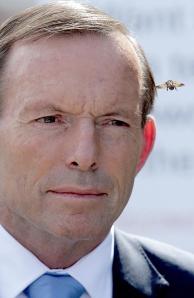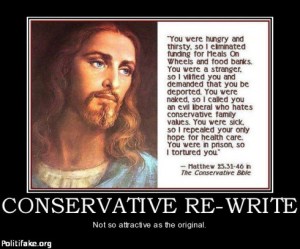Abbott uses society’s vulnerable as means to an ideological end
Can anybody make any sense out of what this government doing? asks Jennifer Wilson.It seems to me that it’s a core conservative tradition
to use the most vulnerable people in society as a means to an
ideological end. There are endless current examples of this: threats to
pensions, restricted access to Newstart for unemployed youth,
destruction of universal healthcare, proposed reduction of the minimum
wage and a cap on that wage for the next ten years, all part of the Commission of Audit’s recommendations to the Abbott government prior to its first budget in a couple of weeks.
None of these measures will affect anyone as disastrously as they
will affect the poor, and while middle class journalists on a good
wage, some of whom are Abbott’s most vocal supporters,
scream like stuck pigs about the flagged “debt levy” on incomes over
$80,000, nobody much is pointing out the ideologically-based, systematic
crippling of the lives of those who struggle hardest to keep poverty
from their doors.
Conservatives seem to hold the ideological position that poverty is a
moral failing, for which the individual is solely accountable, and if
that individual has been incapable of taking care of her or himself and
his or her family, they’ve no one to blame but themselves. If they do
sink into a morass of underprivileged misery then they ought to be able
to find ways to redeem themselves. If they don’t manage this feat, they
obviously only deserve what little they get, and the conservative will
do his or her best to take even that away.
This unexamined belief that the less financially fortunate are
immoral and a drain on the prudent is, it seems, impossible to eradicate
from the consciousness of the privileged and entitled, who lack any
ability to comprehend context, and the myriad forces at work in society
that affect the course of a life. This, coupled with the conservatives’
traditional love of a good clichéd stereotype, works to reinforce their
sense of entitlement, and their contempt for anyone less blessed than
are they.
The conservative disregard, some may even allege contempt, for those
other than (lesser than) themselves, allows them to use rational agents
as a means to an end, contradicting the Kantian position that to use
others as a means, and not an end in themselves, is to flout the
fundamental principle of morality. Perhaps this is nowhere as starkly
obvious as in the current and previous governments’ treatment of asylum
seekers. Both major political parties have, for many years now, used
boat arrivals as a means to achieve political success, and not as
rational agents deserving of consideration as ends in themselves. In
this sense, the ALP finds itself on the same side as conservative
politicians, something that should chill the heart of any ALP supporter.
There is no point in decrying the lack of humanity and compassion in
conservative ideology. Both qualities are regarded as belonging to the
bleeding hearts of the left, hindrances to freedom, obstacles to profit.
So we find ourselves in the bizarre position of having a Human Rights
Commissioner for Freedom, Tim Wilson, who recently claimed that McDonalds has “human rights to own property” and that “spending” is an expression of free speech.
It’s a dangerous situation when a Commissioner for Human Rights
equates the ability to spend with the right to freedom of any kind,
including speech.
It makes no sense to take any measures that prevent
or discourage people from taking care of their health, such as
co-payments for doctor visits for example. This will increase the
pressure on accident and emergency departments, already stretched beyond
their means, and result in people becoming chronically ill, at much
greater expense to the taxpayer.
It makes no sense to continue to spend billions of dollars
incarcerating a few thousand asylum seekers, for example, when there are
many less expensive options such as allowing refugees to live in,
work, and contribute to the community.
It makes no sense to waste billions on a paid parental leave system
when the money could be much better invested in increased child care for
parents who want to work, but find it difficult to access adequate care
for their offspring. Good child care is also an investment in our
future: children can benefit enormously from early education and
socialisation, a child care centre doesn’t simply “mind” them, it
educates them.
However, none of the above is of any consequence to a political party
driven by ideology. Humans are, to such a party, a means to an
ideological end, not an end in themselves. Obviously, it is much easier
to treat the less financially blessed as a means to an end, and if you
already believe poverty and disadvantage to be indicators of lack of
morality and worth, why would you care anyway?
You may not agree with Kant’s categorical imperative, but there is
something very dark about the Abbott government’s willingness to impose
harsh circumstances on those already doing without in this wealthy
country. It is easy, Mr Abbott, to make life more difficult for those
without the power to protest. It is more of a challenge to work towards
an equitable society based not on ideology, but common sense, and
respect for everyone’s humanity.
Note: It’s with my tongue firmly in my cheek that I use this conservative image of Jesus.
This article was first posted on Jennifer’s blog “No Place For Sheep” and reproduced with permission.



No comments:
Post a Comment